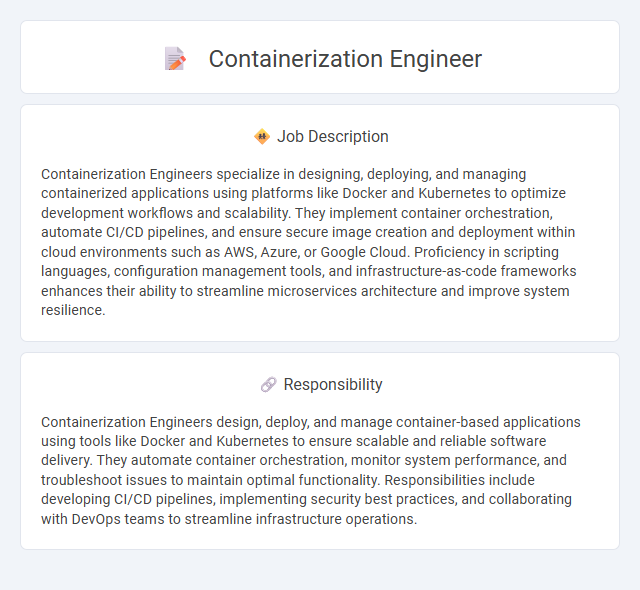
Containerization Engineers specialize in designing, deploying, and managing containerized applications using platforms like Docker and Kubernetes to optimize development workflows and scalability. They implement container orchestration, automate CI/CD pipelines, and ensure secure image creation and deployment within cloud environments such as AWS, Azure, or Google Cloud. Proficiency in scripting languages, configuration management tools, and infrastructure-as-code frameworks enhances their ability to streamline microservices architecture and improve system resilience.
Individuals with strong problem-solving skills and a keen interest in cloud-native technologies are likely to thrive as Containerization Engineers. Those who enjoy working in fast-paced, collaborative environments and can handle complex automation and orchestration tasks may find this role particularly suitable. Conversely, people who prefer routine tasks or have limited technical adaptability might face challenges in this dynamic field.
Qualification
A Containerization Engineer must possess expertise in Docker, Kubernetes, and container orchestration technologies, along with proficiency in cloud platforms such as AWS, Azure, or Google Cloud. Strong skills in scripting languages like Python, Bash, or Go, combined with experience in CI/CD pipelines and infrastructure as code (IaC) tools like Terraform or Ansible, are essential. A solid understanding of microservices architecture, Linux systems administration, and network security principles further qualifies candidates for this role.
Responsibility
Containerization Engineers design, deploy, and manage container-based applications using tools like Docker and Kubernetes to ensure scalable and reliable software delivery. They automate container orchestration, monitor system performance, and troubleshoot issues to maintain optimal functionality. Responsibilities include developing CI/CD pipelines, implementing security best practices, and collaborating with DevOps teams to streamline infrastructure operations.
Benefit
A Containerization Engineer likely contributes to streamlined application deployment by packaging software and dependencies into standardized containers, improving scalability and resource efficiency. Their role probably reduces conflicts between development and operations teams, fostering faster, more reliable continuous integration and continuous delivery (CI/CD) pipelines. Organizations employing Containerization Engineers may experience enhanced system portability and easier management of complex microservices architectures.
Challenge
A Containerization Engineer likely faces complex challenges involving the integration of container technologies with diverse cloud and on-premises environments. Troubleshooting container orchestration issues and ensuring seamless scalability could require advanced problem-solving skills and in-depth knowledge of tools like Kubernetes and Docker. The role probably demands continuous adaptation to rapidly evolving container ecosystems and security protocols.
Career Advancement
Containerization Engineers specialize in designing, deploying, and managing container-based environments using tools like Docker, Kubernetes, and OpenShift, enhancing application scalability and efficiency. Mastery of cloud platforms such as AWS, Azure, or Google Cloud, combined with expertise in CI/CD pipelines and microservices architecture, positions professionals for rapid career growth into DevOps leadership or cloud infrastructure roles. Continuous skill development in automation, security, and orchestration technologies drives advancement opportunities and higher salary prospects within the evolving containerization landscape.
 kuljobs.com
kuljobs.com